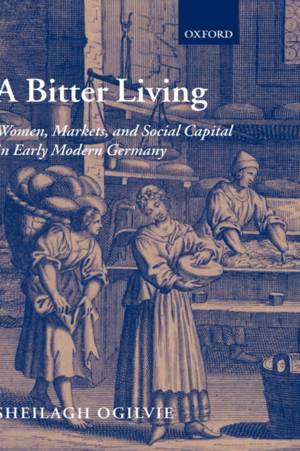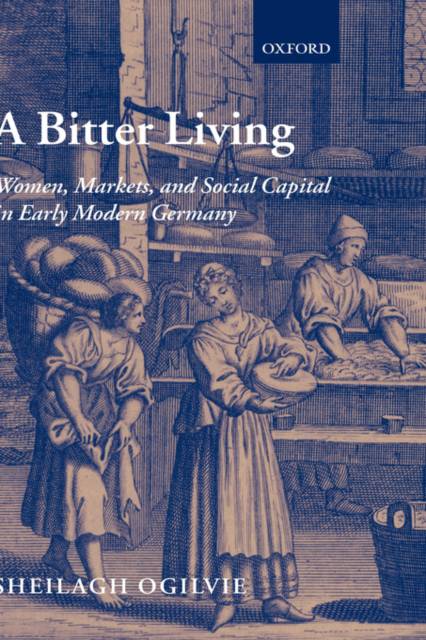
Bedankt voor het vertrouwen het afgelopen jaar! Om jou te bedanken bieden we GRATIS verzending (in België) aan op alles gedurende de hele maand januari.
- Afhalen na 1 uur in een winkel met voorraad
- In januari gratis thuislevering in België
- Ruim aanbod met 7 miljoen producten
Bedankt voor het vertrouwen het afgelopen jaar! Om jou te bedanken bieden we GRATIS verzending (in België) aan op alles gedurende de hele maand januari.
- Afhalen na 1 uur in een winkel met voorraad
- In januari gratis thuislevering in België
- Ruim aanbod met 7 miljoen producten
Zoeken
A Bitter Living
Women, Markets, and Social Capital in Early Modern Germany
Sheilagh Ogilvie
Hardcover | Engels
€ 451,45
+ 902 punten
Omschrijving
What role did women play in the pre-industrial European economy? Was it brought about by biology, culture, social institutions, or individual choices? And what were its consequences - for women, for men, for society at large? Women were key to the changes in the European economy between 1600 and 1800 that paved the way for industrialization. But we still know little about this female 'shadow economy' - and nothing quantitative or systematic.
This book tackles these questions in a new way. It uses a unique micro-level database and rich qualitative sources to illuminate women's contribution to a particular pre-industrial economy: the German state of Württemberg, which was in many ways typical of early modern Europe. Markets expanded here between 1600 and 1800, opening opportunities outside the household for both women and men. But they were circumscribed by strong 'social networks' - local communities and rural guilds with state support. Modern political scientists have praised social networks for generating 'social capital' - shared norms and collective sanctions which benefit network insiders, and sometimes the whole society. But this book reveals the dark side of 'social capital': insiders excluded and harmed outsiders, especially women, to the detriment of the economy at large.
Early modern European economies differed widely in their restrictions on the role of women. But the monocausal approaches (technological, cultural, institutional) that dominate the existing literature cannot explain these differences. This book proposes an alternative approach driven by the decision individual women themselves made as they negotiated a wide array of constraints and pressures (including technological, cultural, and institutional ones). We are not only brought closer to the 'bitter living' pre-industrial women scraped together, but find out how it came to be so bitter, and how restrictions on women inflicted a bitter living on everyone.
This book tackles these questions in a new way. It uses a unique micro-level database and rich qualitative sources to illuminate women's contribution to a particular pre-industrial economy: the German state of Württemberg, which was in many ways typical of early modern Europe. Markets expanded here between 1600 and 1800, opening opportunities outside the household for both women and men. But they were circumscribed by strong 'social networks' - local communities and rural guilds with state support. Modern political scientists have praised social networks for generating 'social capital' - shared norms and collective sanctions which benefit network insiders, and sometimes the whole society. But this book reveals the dark side of 'social capital': insiders excluded and harmed outsiders, especially women, to the detriment of the economy at large.
Early modern European economies differed widely in their restrictions on the role of women. But the monocausal approaches (technological, cultural, institutional) that dominate the existing literature cannot explain these differences. This book proposes an alternative approach driven by the decision individual women themselves made as they negotiated a wide array of constraints and pressures (including technological, cultural, and institutional ones). We are not only brought closer to the 'bitter living' pre-industrial women scraped together, but find out how it came to be so bitter, and how restrictions on women inflicted a bitter living on everyone.
Specificaties
Betrokkenen
- Auteur(s):
- Uitgeverij:
Inhoud
- Aantal bladzijden:
- 412
- Taal:
- Engels
Eigenschappen
- Productcode (EAN):
- 9780198205548
- Verschijningsdatum:
- 28/08/2003
- Uitvoering:
- Hardcover
- Formaat:
- Genaaid
- Afmetingen:
- 156 mm x 234 mm
- Gewicht:
- 757 g

Alleen bij Standaard Boekhandel
+ 902 punten op je klantenkaart van Standaard Boekhandel
Beoordelingen
We publiceren alleen reviews die voldoen aan de voorwaarden voor reviews. Bekijk onze voorwaarden voor reviews.









